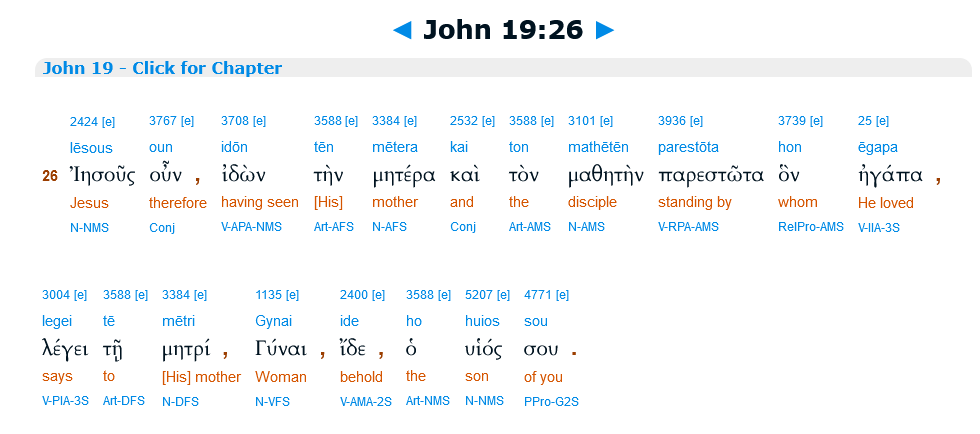It is somewhat of a mystery as to what happened to Joseph. Our pastor has been going through the nativity figures in his sermons, and yesterday went over how Joseph was righteous, compassionate, willing to sacrifice and protect his family, and helped teach and guide Jesus. But, after the episode of leaving Jesus behind at the temple around age 12, he disappears from the scripture. Perhaps he died, but it is somewhat strange that his death was not recorded or mentioned, and Mary was never described as a widow. I wonder if his absence is due to something more scandalous, and that is why he is never mentioned. Perhaps Jesus’ teachings on divorce and marriage reflect that trauma. Perhaps that is why Mary never remarried. All supposition, but it would explain some things a bit better. Am I totally off track? Maybe I am.
I have had these same thoughts about Joseph. That Joseph divorced Mary would make a lot of sense. Apparently divorce was quite common in their day with the men doing the divorcing, to get new women and more children.
When something is left a mystery, it tickles our mind. We would like to know but when we cannot, that opens the room for speculative guesses and storytelling. I bet there are stories about the fate of Joseph in history, not necessarily true but something to fill the black hole of not knowing.
Gospels are very selective history writing, with an intention to tell about Jesus as the promised Messiah. Gospels focus on the years when he was followed by his disciples, the most likely sources of the information. Luke may have interviewed Mary and recorded the best pieces of what she told, based on the fact that Luke tells about the experiences of Mary during the time she became pregnant. Yet, even mother Mary plays a very minor role in the description of what Jesus did. The lack of information about Joseph during the years when Jesus was active suggest that Joseph was not present during those years. It also suggests that Joseph was not available to be interviewed for the gospel of Luke.
Probably the fate of Joseph was not considered important for the purpose of the writing. Gospels pointed to Jesus as the son of God, ‘sired’ by the Holy Spirit. Joseph was a supporting character that had a role as the man who took care of the Jesus child. Maybe stressing his role would have directed the interest to a side track that did not bring the main story forward. We are not told, so everything is just speculation.
I have a hard time imagining Joseph going to divorce her. He was barely going to divorce her, and do it quietly when he thought she cheated. Given it says he saw angels, who said not to leave I think the alternative is more likely that he was much older, and that he simply died on the run. But it’s all speculation. Joseph could just be an invention and Mary was never married. But I always assumed he died or was murdered. I imagine even after they fled, someone pursued them. Someone was willing to tell someone hence the gospels mentioning them fleeing to Egypt.
- Joseph and Mary are known in John 6:42.
- From the cross, Jesus speaks to Mary and “the beloved disciple” and commends each to the other. Joseph is never mentioned,. I’m inclined to think Joseph died during Jesus’ ministry, otherwise wouldn’t you think he would have been at the cross too?
that he died is the traditional view. It just seems odd that his death or Mary being a widow is never mentioned. There is also that situation where Jesus is referred to as the Son of Mary in Mark 6.
We have no record of Joseph saying: “That’s my boy” or stepping up and saying: “I’ve known Jesus for years and can vouch for the fact that my wife is his mother, but beyond that, I ain’t saying nothing.”
It’s one of those deafening silences scriptures give us. Sorta like the silence (for me) on whatever became of Lazarus too! Surely it would have been newsworthy to see how someone fares whom was allowed to cheat death once. The Chosen series at least puts some post-death dialogue in his mouth. And it’s bad enough that the other three gospels (earlier than John) who aren’t shy about repeating important events/miracles contained in the other three - they have a stunning silence on the whole episode entirely! Liberal Bible scholars would certainly have no loss of explanation for that. Conservative ones probably just avoid mentioning such things.
But it is fun to think about! What if Joseph’s death was scandalously unremarkable?
[Or is it already some early ‘discounting’ of Joseph’s real connection to Jesus in that it’s Mary that shares in his bodily existence while Joseph ostensibly doesn’t? … “sure! Let’s record his role in the early childhood years where he has some significant protective role to play, but after that, he’ll be more a distraction than a contributor to the main focus of the narrative.”]
I find it interesting that so little is said about him in the New Testament given that family patriarchs were so engrained into the Old Testament historical account. Given i like to research and am a fan of cross referencing my sources…
From the Catholic reference below, it seems logical to me that its likely Joseph died before Christ started his ministry. Given there is quite a gap between Christs first few years of life and his ministry around the age of 30, if Joseph died during those years, then that would be a good reason why so little is written and known about him in the New Testament…
Catholic Tradition on Joseph’s Death
Catholic tradition holds that Joseph died peacefully in the presence of Jesus and Mary. According to this tradition, Joseph passed away when Jesus was an adolescent, likely in 18 or 19 AD, which is the time of “Joseph when Jesus died”, indicating that he died before Jesus’ public ministry began.
The impact of Joseph’s death on the Holy Family would have been significant, leaving Jesus and Mary without a paternal figure to provide support and protection. This may have influenced Jesus’ instruction for the Apostle John to care for Mary after his crucifixion, ensuring she would be cared for in Joseph’s absence. Encounter Church FW
There is also an interesting discussion about Joseph on the Christianity portal at stack exchange…which is well worth the read
for those who dont want to go to the stack exchange site, wikipedia has an article on Joseph
I’m more of a Romantic. I think the lack of references to Joseph during Jesus’s ministry means he may have passed away. Maybe in joining us in our humanity, Jesus felt the early loss of a parent and maybe even though He could raise the dead, it wasn’t in God’s plan for Him to do so in regards to His own earthly father and He had to accept that.
Vinnie
My favorite is that Joseph died when Jesus turned 30, prompting the start of Jesus’ ministry.
I recall the first time I read that – I asked, “But then what?!”
I had a professor who tongue-in-cheek maintained that an angel told Joseph when he was going to die, so Joseph built a coffin just in time and lay down in it in his workshop. Combining that with the above idea and you’ve got Jesus finding the coffin, calling the village elders, then telling Mary, “That’s my signal – time to get moving!”
Us good Catholics know it was his mother, Mary that gave Him the signal!
Jesus: My time has not yet come.
Mary: Yes it has * she tells the servants to do whatever he commands and Jesus listens to mom*
God chose well!
I do not like the way you have projected modern practices on the ancient past. It reeks of an attempt to attach a greater objectivity to the gospel accounts than is likely. It is far more believable that people wrote these stories based on hearsay – memories of stories which were told by those with the memories of the events. Trying to fit this into modern professional categories is not realistic.
From Wikipedia
Although the question-and-answer interview in journalism dates back to the 1850s , the first known interview that fits the matrix of interview-as-genre has been claimed to be the 1756 interview by Archbishop Timothy Gabashvili (1704–1764), prominent Georgian religious figure, diplomat, writer and traveler
For me, interviewing is asking and getting answers. It does not have to be systematic interviewing. Hearsay can be one form of it. You ask what happened and someone tells. If you did not get some point or want to know more about some point, you can ask that point and the person telling can clarify. I guess this opportunity of two-way communication was the reason why some valued oral more than written teaching.
The gospel according to Luke has a Methods section (Luke 1:1-4):
“Since many have undertaken to compile an account of the things accomplished among us, just as they were handed down to us by those who from the beginning were eyewitnesses and servants of the word, it seemed fitting to me as well, having investigated everything carefully from the beginning, to write it out for you in an orderly sequence, most excellent Theophilus; so that you may know the exact truth about the things you have been taught”
The marital status of most of the women Jesus interacts with isn’t mentioned, with the one exeception being Joanna wife of Chuza. Maybe her husband was only mentioned because he was rich and influential. But it seems unlikely that all the women disciples were single ladies.
Good passage to quote in response to my objection. Excellent!
So human! Joseph was caretaker to Jesus’ mother and perhaps father to James - certainly father to James, where the unknown is whether he is older than Jesus (mother deceased) or younger.
But since Joseph is secondary to Jesus’ descent into human form, he just isn’t critical to the drama.
I think it is the theological equivalent of keeping it simple. Joseph is not mentioned because frankly after the Birth of Jesus, there just isn’t really that much for him to do.
Like quite a lot of things over the pantheon of Scripture. Joseph is the Biblical equivalent of an NPC in a “video game”.
Yeah, you’re off track (LOL)…but good topic. If Joseph were all those wonderful things, would he really be party to a divorce? The gospels had other purposes besides being fodder for the supermarket scandal sheet. Joseph and Mary/Maryam were members of a very small town, clannish and pretty much “everyone was in everyone’s grill,” to use a modern phrase. They also, from what I have read, were part of a culture that had embraced something of a “back to the Bible” movement. That is why people were naming their children after ancient biblical characters (Jesus = Joshua, etc). And Joseph did the honorable thing with Mary—rather than have her stoned. Yes of course “stuff happens.” But disease, work-related accident, and then death much more likely. The gospels were not biographies in the way we want biographies to be (your childhood traumas, struggle with bulimia, how many ex-wives, quarrels with coworkers, etc). They were written for other purposes.


